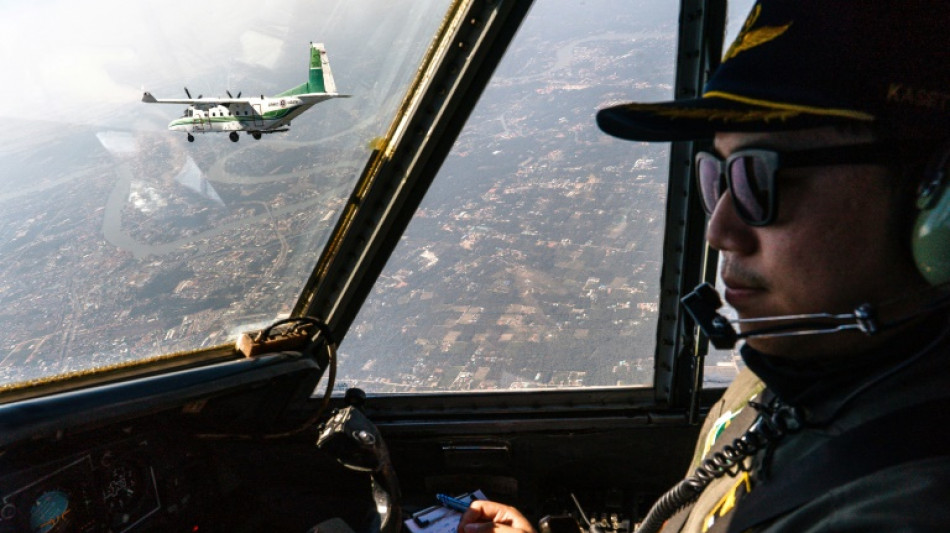
JRI
0.1450

Flying through Bangkok's cloudless blue skies, a small aircraft sprays a white mist over a thick haze of pea soup smog below.
This is Thailand's desperate, unproven attempt at reducing the oppressive air pollution over its capital, which on Thursday reached eight times the World Health Organization's recommended daily maximum average.
The scourge has made more than a million people ill since late 2023 and cost Thailand more than $88 million in medical expenses, the public health ministry said earlier this month.
According to Bangkok governor Chadchart Sittipunt, the main culprits are vehicle emissions, crop burning in the wider region and "closed" weather conditions -- a warm atmospheric lid covering the dust, preventing it from dispersing.
Known as a temperature inversion, the kingdom is trying to deal with the phenomenon using a homegrown experimental method to displace the pollution.
Twice a day, the Royal Rainmaking department sends aircraft up to spray cold water or dry ice into the layer of warm air to cool it down.
Critics say there is little to no evidence it works.
AFP was granted exclusive access on board a flight over the outskirts of Bangkok.
Inside the small craft -- which climbed to an altitude of around 1,500 metres (5,000 feet) -- a scientist tracks the flight path on an iPad as two crew members release icy water from a pair of large blue containers that sprays out from the craft's belly.
The theory is that reducing the temperature difference between the levels makes it easier for the trapped particles, known as PM2.5, to disperse into the upper atmosphere.
It is an unconventional method the department says is only used in Thailand.
"This is not the usual cloud seeding," said programme head Chanti Detyothin.
- 'Doing our best' -
Countries have long tried "cloud seeding" -- injecting chemicals such as silver iodide into clouds to trigger rain or snowfall -- in attempts to alleviate drought and, increasingly, air pollution.
But its effectiveness is open to question and scientists say it has been shown to only be marginally useful in creating rain and absorbing pollutants.
Thailand's worst smog happens during the dry season between December and April, when it is too windy and cloudless to induce precipitation.
The new technique was first used last year and is still in its testing stages.
Another aircraft measures pollutant concentrations before and after spraying to gauge the difference in air quality.
"The concentration (of PM 2.5) is less," said Chanti.
"The data suggests that at the level of our area of focus, the dust cleared up," though he admits they cannot "make the pollution go away entirely. Even with this new technology, there are limitations."
"We have been working every day for Bangkok to have clean air. We are doing our best as much as we can," he said.
- Oil and gas firm -
Ahead of takeoff, rainmaking staff pile a tonne (1,000 litres) of either dry ice, or ice and water into a plane -- traditional cloud-seeding aircraft with repurposed spraying equipment.
The dry ice -- solidified carbon dioxide -- is provided by Thailand's oil and gas giant PTT and other energy companies.
PTT did not immediately respond to requests from AFP for comment.
Another fossil fuel company, Bangkok Industrial Gas, also donated dry ice to the programme this month, with managing director Piyabut Charuphen saying in a statement the gift was part of their "commitment to creating a sustainable future".
Carbon dioxide is itself a greenhouse gas and the environmental and health effects of spraying dry ice in the atmosphere are not fully understood.
Weenarin Lulitanonda, co-founder of Thailand Clean Air Network, accused the energy firms of "using cilantro to garnish their dish".
The Thai idiom, she explained, meant that "instead of solving the problem, (they) are creating a beautiful image".
Just one flight can cost up to $1,500, and with aircraft taking off from three bases around the country, it can reach $9,000 per day.
Ekbordin Winijkul of the Asian Institute of Technology said it is more cost-effective for Bangkok to address the causes of pollution with proven measures such as low-emissions traffic zones.
City authorities are already pursuing many of these, he said, like banning some heavy-duty vehicles and working with other provinces to control agricultural burning.
"Before we try to do something," he said, "at least we should have confidence in the data first".
S.Janousek--TPP